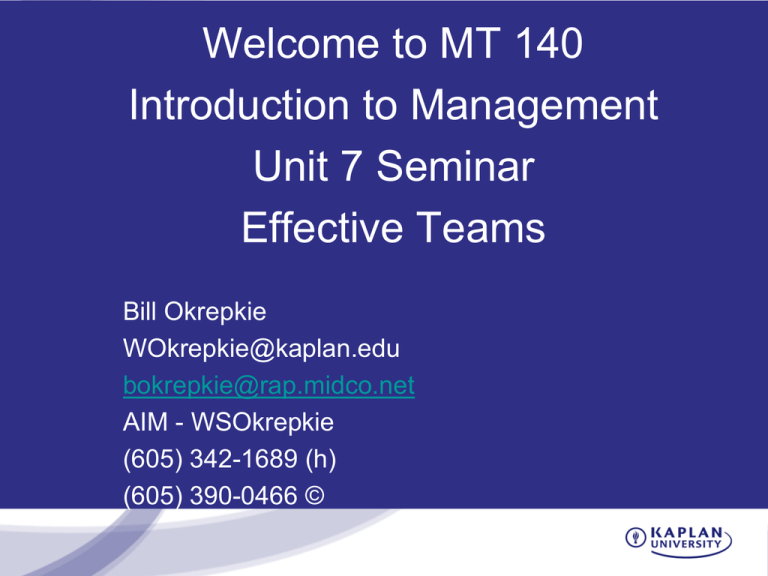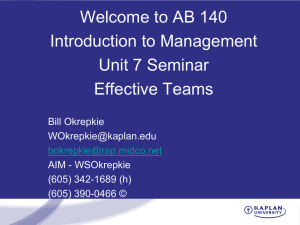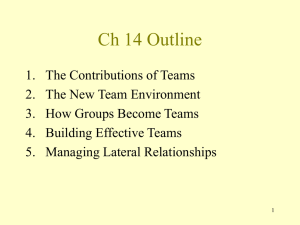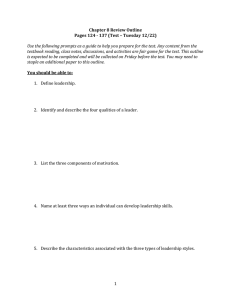Document
advertisement

Welcome to MT 140 Introduction to Management Unit 7 Seminar Effective Teams Bill Okrepkie WOkrepkie@kaplan.edu bokrepkie@rap.midco.net AIM - WSOkrepkie (605) 342-1689 (h) (605) 390-0466 © Agenda • • • • • • • General Questions and Announcements Review of last week’s seminar Why Some Groups Fail Contribution of Teams to an Organization Types of Teams Unit Assignment Clarification Conclusion of Seminar Did I Answer all your questions from last week. Review of Last Week’s Seminar • External Audit • Internal Audit • Six Sigma is a quality management concept that has the goal of eliminating defects from a company’s product or service. The Control Process Discussion Question • Refer to the unit readings, and in your best judgment based on the readings, do you think that a control system needs to be developed to address these issues? Why or why not? • Your thoughts Assignment • How can Jenny apply the four step control process outlined in the text to address this problem? • Your thoughts. Let’s talk about effective teams Why some groups fail • • • • • Managers just putting people together Launched with little or no training Not allowed to make important decisions Make only safe decisions New skills needed: - Diplomacy - People issues - Autonomy vs. independence - Managers need to give up control Some issues for failing • • • • • • Ineffective communication Lack of vision or goal setting Clarity about roles Keep morale up Keep productivity high Lack of trust So why bother with teams or groups The Contributions of Teams Benefiting of the organization directly… • A team of individuals addressing an issue can experience breakthroughs and develop fresh ideas that may not have been possible with a single individual. • Teams can increase production, improve quality, and reduce costs. • Teams can enhance speed and be powerful forces for innovation and change. Types of Teams Let’s take a look Different Types of Organizational Teams • Transitional Teams - work groups composed of multinational members whose activities span multiple countries • Virtual Teams - teams that are physically dispersed and communicate electronically more than face-to-face • Traditional Work Groups - groups that have no managerial responsibilities Different Types of Organizational Teams, cont’d. • Quality Circles - voluntary groups of people drawn from various production teams who make suggestions about quality • Semiautonomous Work Groups - groups that make decisions about managing and carrying out major production activities but get outside support for quality control and maintenance • Autonomous Work Groups - groups that control decisions about and execution of a complete range of tasks Different Types of Organizational Teams, cont’d. • Self-Designing Teams - Teams with the responsibilities of autonomous work groups, plus control over hiring, firing, and deciding what tasks members perform • Self-Managed Teams - Autonomous work groups in which workers are trained to do all or most of the jobs in a unit, have no immediate supervisor, and make decisions previously made by first-line supervisors The New Team Environment Recap • In this seminar, we’ve discussed: - Why some groups fail - How teams contribute to organizations - Various types of teams Assignment Questions and Answers There are three graded assignments in Unit 7: 1.Review Quiz 2.Discussion question and participation 3.Assignment Are there questions concerning how you are expected to complete and submit these assignments? Discussion Question • Consider a position that you hold now (paid or unpaid) or one that you’ve held in the past. Review Table 11.1 by clicking the Table 11.1 button above (available also on page 245 in the Bateman and Snell text) about the traditional and new team environments. Which environment best describes your job? Describe your position based on the dimensions in the table for the environment that applies to you. The New Team Environment Assignment • Lately, Jack has mostly been visiting the operating locations and addressing manager operations concerns. Jenny has concentrated on financial matters like budget preparation, leases, taxes, and overseeing the daily accounting process. Both Jack and Jenny are pleased with Sandwich Blitz’s past performance but feel that they are each unable to devote their time and energy to take the business to the next level. All of their time seems to be occupied with “fighting little fires” within the existing operation. Jack has heard that other businesses have successfully used a team approach to managing with good results and wonders if this could help him as well as the location managers. Assignment, Con’t • After reading the scenario above and the section on Self-managed Teams on page 247 of your text, explain how self-managed teams could be used at Sandwich Blitz to allow Jack more time to devote to growing the business. • Self-Managed Teams - Autonomous work groups in which workers are trained to do all or most of the jobs in a unit, have no immediate supervisor, and make decisions previously made by first-line supervisors You all did great today! I can hardly wait until next week . Any other questions from this seminar It looks like the hour is up. I hope this session was valuable to you and I look forward to seeing you next week. Have a great week and weekend.








